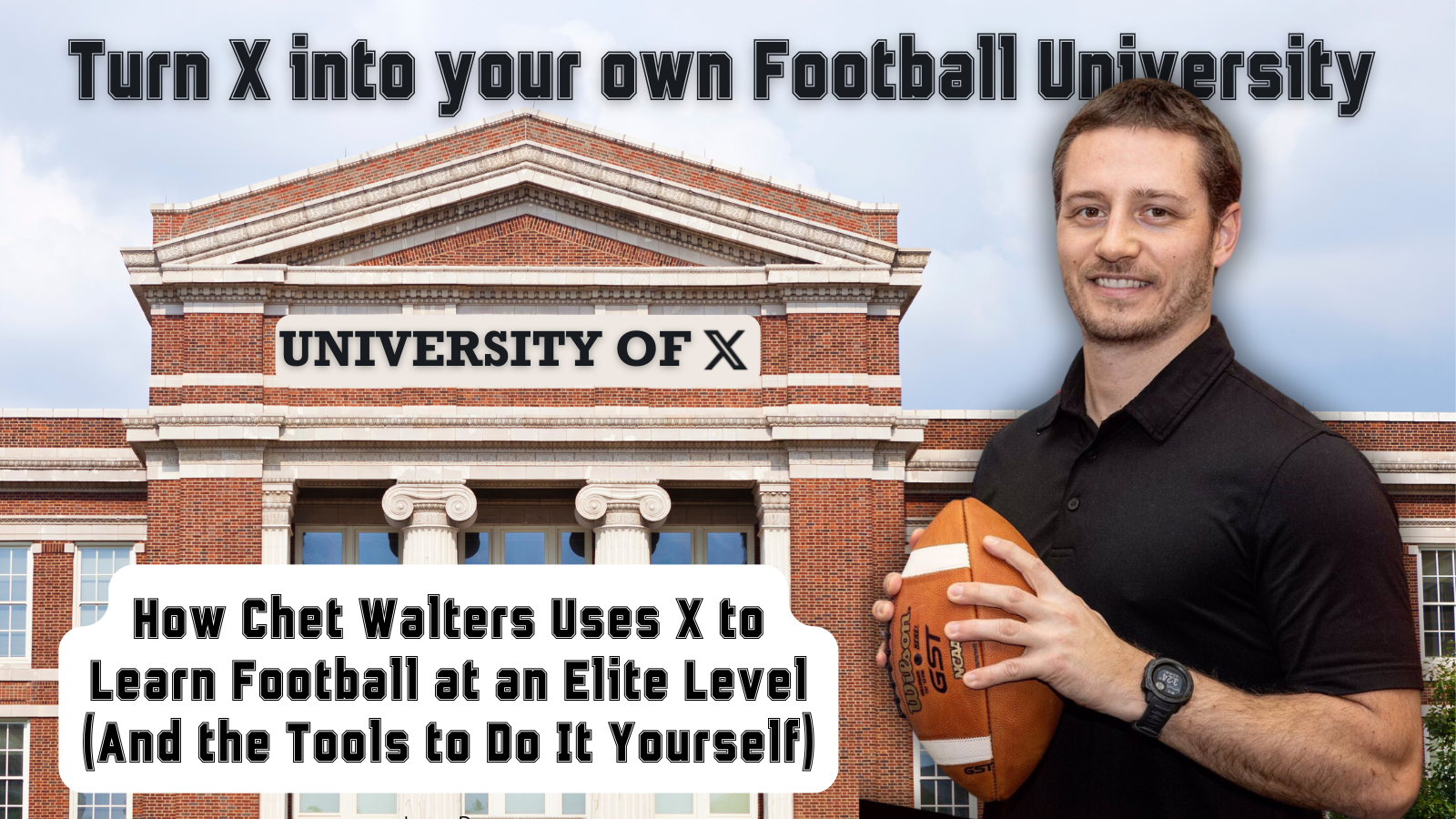
In the modern era of coaching, learning the game isn’t limited to film study, books, and clinics. For Chet Walters, the head coach at Conrad Schools of Science in Delaware, one of his most powerful tools for development isn’t a whiteboard—it’s X (formerly Twitter).
Walters has turned X into his personal football university, using it to gather, organize, and refine knowledge that directly impacts his program. But it’s not just about scrolling and bookmarking—he’s developed a structured system that ensures ideas become actionable.
A Football Feed Built for Learning
Unlike casual users who scroll for entertainment, Walters has carefully curated his feed to serve as a nonstop source of football education. His timeline is filled with:
- Film cut-ups from college and NFL coaches
- Breakdowns of trending concepts from high-level analysts
- Drill ideas and technical coaching tips from specialists
- Discussions on scheme evolution, player development, and game management
By following the right people—coaches, analysts, and data-driven football minds—Walters ensures that every scroll through X provides new insights.
The Bookmark System: Turning X Into a Playbook
Rather than passively consuming information, Walters actively bookmarks anything he finds valuable. This is his first level of filtering, a way to collect interesting ideas without distraction.
Making Bookmarks Actionable
Bookmarks can quickly pile up, which is why Walters uses a second layer of tools to sort and refine them. He doesn’t just save—he organizes for future implementation.
The Google Drive Funnel: Organizing Knowledge
Once a bookmarked post proves valuable, Walters moves it into Google Drive, where he categorizes information by:
- Scheme (Offense, Defense, Special Teams)
- Concept Type (Pass Game, Run Game, Protections, Coverages)
- Specific Techniques (QB Reads, WR Releases, OL Blocking, etc.)
By doing this, Walters transforms scattered social media insights into a structured, accessible knowledge base that he and his staff can tap into.
Applying the Best Ideas in Huddle
Only the most relevant and applicable ideas make it into Huddle, where Walters refines them for his team.
This is where concepts turn into practice plans, playbook updates, and install meetings.
His process ensures that only actionable information makes it onto the field, eliminating the noise and focusing on what fits his team.
X as a Networking Tool
Beyond gathering information, Walters uses X as a connection hub.
- Engaging in discussions
- Responding to film breakdowns
- Reaching out to coaches
These interactions have helped him land private Zoom sessions with experts, exchange film, and adjust his scheme based on real-time feedback from trusted voices.
Tools for Organizing Twitter/X Knowledge Like a Pro
While X’s bookmarking feature is useful, a structured workflow requires more advanced tools to sort, categorize, and turn raw information into a usable format.
Here are four essential tools that can help coaches streamline their X-learning process:
1. Dewey – AI-Powered Bookmark Organization
Dewey is a bookmark manager that syncs with X and automatically categorizes saved posts.
- Auto-tagging: Dewey uses AI to suggest categories and labels.
- Custom filters: Coaches can create folders for offense, defense, special teams, and drills.
- Searchable database: Makes it easy to find past bookmarks instead of endlessly scrolling.
Best For: Coaches who want a structured, automated way to categorize and find their saved football content.
2. Twillot – Organizing Twitter Bookmarks into Playbooks
Twillot is a Twitter bookmark organizer that lets users create shareable folders.
- Drag-and-drop sorting: Coaches can organize tweets into specific playbook categories.
- Collaboration: Share folders with assistants to discuss and refine ideas.
- Export options: Save tweets as PDFs or spreadsheets for further study.
Best For: Coaches who want to build a shareable football knowledge base with their staff.
3. Twitter Bookmark Exporter – Taking Bookmarks Beyond X
This tool lets users export all their X bookmarks into a CSV or Excel file, making them easy to sort manually.
- Bulk organization: Export thousands of bookmarks at once.
- Spreadsheet sorting: Assign categories, track trends, and filter by play types.
- Offline access: Coaches can review their saved content even without internet.
Best For: Coaches who prefer spreadsheet-based organization and manual sorting.
4. Tweetsmash – The Power of Twitter Bookmarks + AI Summaries
Tweetsmash goes beyond bookmarking by allowing users to create AI-generated summaries of tweets.
- Auto-generated summaries: Quickly extract key points from coaching threads.
- Keyword-based organization: Find specific topics (e.g., “Cover 4 Adjustments”) instantly.
- Text-to-PDF conversion: Save and print useful coaching insights for study sessions.
Best For: Coaches who want to digest information faster without re-reading long threads.
The Continuous Loop of Learning
Walters’ process creates a continuous cycle of learning:
- Discover – Scroll through X, bookmark valuable insights.
- Organize – Move the best ideas into Dewey, Twillot, or Google Drive for deeper study.
- Refine – Filter, tweak, and prepare key concepts for implementation.
- Apply – Integrate select concepts into Huddle and practice plans.
- Evaluate – Track efficiency, adjust, and refine for future improvement.
Why This Works for Coaches
Chet Walters’ approach to learning football isn’t passive—it’s systematic and intentional.
By curating, collecting, and filtering content on X using advanced tools, he ensures:
- No wasted ideas
- Faster access to key insights
- A structured path from concept to application
For any coach looking to sharpen their knowledge in the digital age, Walters’ method offers a blueprint:
Curate → Organize → Apply → Refine → Repeat.
By integrating Dewey, Twillot, Twitter Bookmark Exporter, or Tweetsmash, any coach can take their football knowledge game to the next level.


